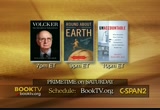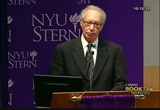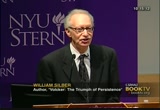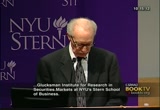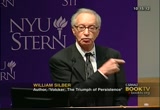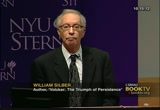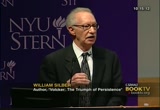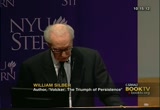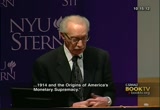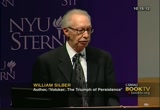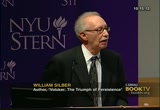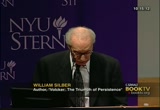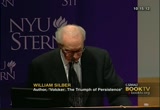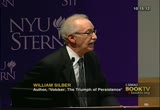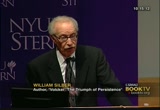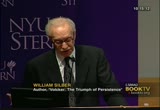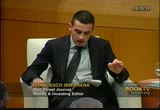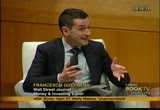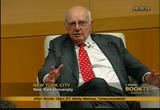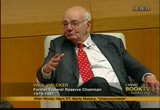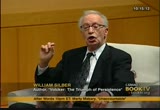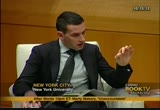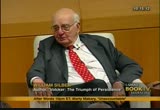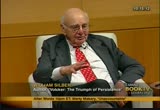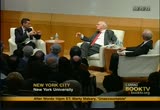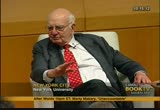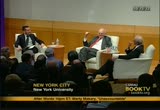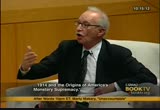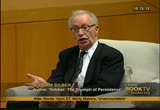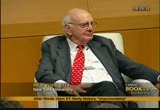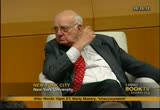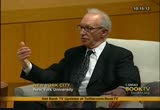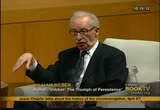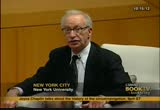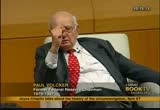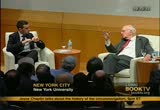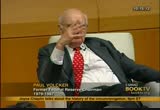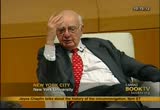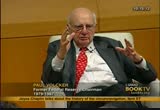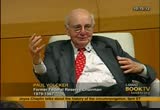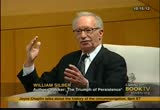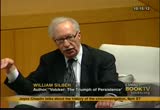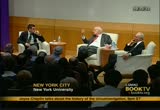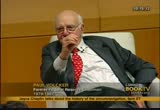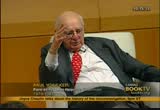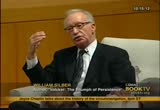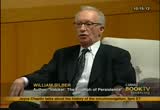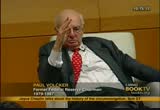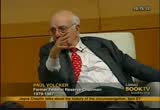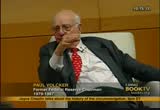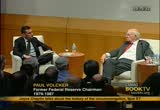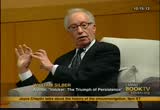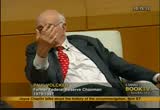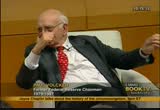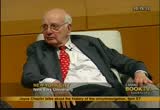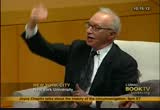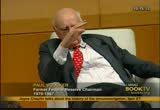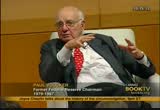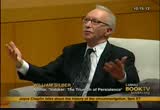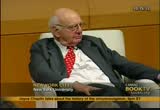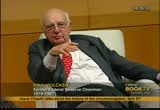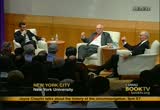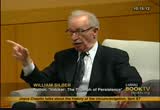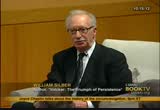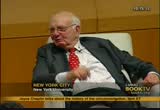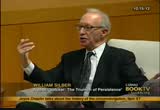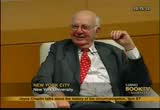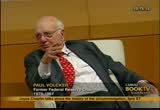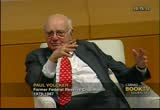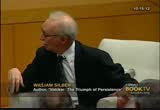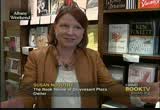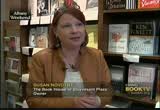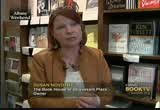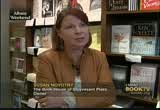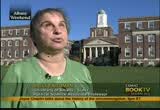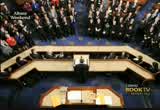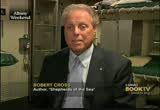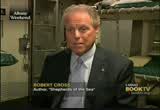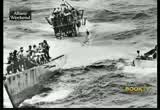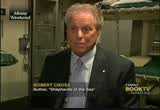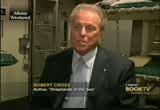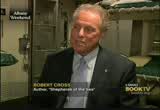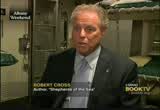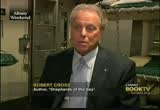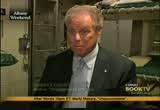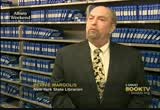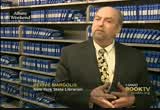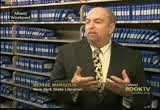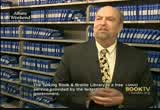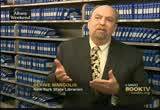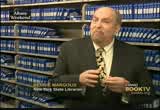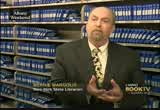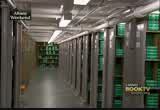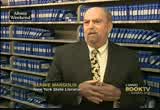tv Book TV CSPAN December 8, 2012 7:00pm-9:00pm EST
7:01 pm
7:02 pm
volcker rule. [laughter] and the fellow on my left loved it. [laughter] but it was knocked out because they say the cute isn't cute so we took the title the triumph of patience" because she did what he did. researching the book i have the perverse -- personal and professional side he dove into the entire contents of the walk-in closet including the elementary school report card and also authorized by reviewing correspondence held in the federal reserve bank of new york. the fed did not like that one bit.
7:03 pm
and finally over $100 of interviews i assure you can guess. let me turn to some substance. a story of the mansard under five presidents serving under the five greatest crisis in history i will tell you about the crisis first broke crisis number one is cold. some of you may remember nixon suspended foreign central banks to exchange
7:04 pm
dollars for gold. he called this particular incident the single most significant event. crisis number two is inflation. the annual rate is double-digit in 1979 jimmy carter appointed him chairman of the federal reserve board over the strenuous objection of his advisers who say it is too independent and outspoken. two months later paul volcker raised interest-rate to higher levels than the chairman himself sought 15% of long-term treasury securities and bond commercial banks and loans
7:05 pm
as a record that still stands. crisis number three is the world financial crisis that is still with us. the volcker rule label was announced to the press by obama january 2010, paul volcker by their role. -- by the president. he heard his name and thought what is that? i think the phrase in the book describing paul volcker is the man who could find fault with the mona lisa. [laughter] he made a living saying no. goldberg 1970s one. inflation 1979. speculation 2010.
7:06 pm
the underlying story line is trust which is the title of the last chapter of the book you can go there and skip the stories obama appointed him chairman of the advisory board the former president of italy wrote paul volcker a letter that still sits in a coma frame on his desk that says we trust you. and i show how he earned the trust and to follow-up with the lessons he learned about trust and his father senior
7:07 pm
1930 through 1950 had a quotation from george washington hanging in a frame behind his desk in a letter he wrote to his officers at the time it said do not suffer your good nature to say yes and you ought to say no. remember it is not a private cause to be injured urban if it did buy your car is" he has said no ever since. paul volcker is known today by the volcker rule but he earned trust synonymous with his name by standing up to political trip pressure with
7:08 pm
inflation that almost destroyed the american financial system. he blames his mother like the rest of us i say he has to stand in line. he was upset because she refused to give him an increase in his allowance at the end of world war ii he was looking at the inflation and of world war ii but the real reason he is obsessed because it is with the honor of government service. he believes inflation undermines trust in government that the government will not abuse the rights as citizens to print money.
7:09 pm
this is the most overlooked but fundamental item for the evil of inflation. trust brings me to the lesson of the book to enjoy the benefits of consuming more than we produce because the world uses the dollar has international money. there are many reasons for the supremacy but the most fundamental is to not debate the concert -- currency by inflating the would be sore the tested going forward and thus we get the long term employment budget under control. i show ultimately he controlled inflation by
7:10 pm
refusing to monetize the budget deficit. the problem began october 79 to drive down inflation from 12% down of 4% by 1982 it was down at 4% but the final victory for interest-rate after congress passed a balanced budget amendment called the gramm-rudman go the proposed draconian cuts in government spending less congress passed a balanced budget. sound familiar? one of the sponsors of the bill said it was a bad idea. yet only after gramm-rudman
7:11 pm
was passed then it climbed below the 10% level they had remained above the paul volcker first six years at the head of the central bank. what chartered the unprecedented legislation? just before past the late senator john heinz uncovered hidden agenda in the paul volcker plan. this so important i am going to reenact the conversation. ready? >> mr. chairman we have agreed the deficit is bad. but in my experience with congress is anything to go by, there will have to be a
7:12 pm
crisis to fix it. my question is, a you prepared to bring about the necessary crisis the year continued restrictive monetary policy? he could hardly believe his years. to avoid a political suicide, i will just say as a matter of general philosophical approach and feel very strongly it is not our job to artificially provoke a crisis. then they say mr. chairman i never intimated that was part of your thinking and he said iowa's cent absolutely sure about that. then hines says but maybe
7:13 pm
the inevitable consequence. paul volcker cannot law old ally -- tala lie and then in fact, it confirms the hidden agenda to maintain painfully high interest rates so monetary policy could go up. of final confirmation this after the bell was passed senator phil gramm called paul volcker to say now we have the budget under control kimmie have the easier monetary policy? he said we will see. that is a typical central banker response. that brings me to today.
7:14 pm
right now the budget is 5% of gnp that is similar to the reagan era budget deficit and bernanke will need a lot of pope to engineer an economic recovery without inflation. the fed raised interest rates after years of inflation had garnered public support for tight monetary policy but now after years of recession and unemployment they may have some resistance to wracked pre-emptively which is the only way to do it. and it is more crucial that congress and the president embark on a plan to balance the full employment budget
7:15 pm
as it did in the '80s and '90s. only then we can trust the total reserve will act responsibly. sorry to end on a sad note. but that was up to you to rescue us with optimism. [applause] >> >> it is a good book. i read it twice. he expects to hear just from him man positive they don't want to hear from me. the book is terrific. paul volcker is a terrific subject and also because if
7:16 pm
this concise, witty, i read business books for a living. it is tough. this is not tough. [laughter] with that said we will have a half-hour conversation and we will hear from you. people will go down up and down the i/o and hand your question card to them. and mr. volcker will respond. you only get two chances. of a bike to start with both of you with of both that era in the present situation
7:17 pm
situation, l.e.t. inflation and unemployment yet to we have the same conditions of the huge budget deficit. is the solution and high interest rates? >> first of all,. [inaudible] [laughter] the eighties were not just a phenomenon but particularly in the united states as people fought to be dealt with but they thought it could be dealt with and central banking became popular that is 20 years ago
7:18 pm
but there is a glorious period of central banking. now we face a huge financial crisis and a big recession. but it does raise the question necessary understandable putting money into the system will lucite of the lesson that we learned in the '70s and '80s? i hope not. but i am very glad when i hear the fed say they take more and more action. but then they say we want to do all in the context of price stability.
7:19 pm
to hope it will be acted upon when the time comes. >> host: you mentioned the fed acted pre-emptively if it works out. when will that be? >> i am not sure. said anybody should say the fed should tighten now. i did not say that. i don't think they should unless the unemployment rate really comes down. but you have to worry about price stability it is like diet and exercise. [laughter] one of the things paul volcker thomas -- taught us the big mistake of the seventies was rebating too
7:20 pm
easy for too long. he was criticized 1985 and when the fed tightened up because it was being pre-emptive. i wonder if ben bernanke or his follower could preemptively raise rates with the legacy of five years of unemployment. >> host: in this context the book that should have been called volcker roles. [laughter] >> they wanted to pay extra for that. [laughter] death threats is really to show the power of the central bank to influence
7:21 pm
the economy so the question facing today as a dead to much to compensate for the political arena where nothing has been done? >> we are in a situation of the thirties and listen driven home to many economists that the great mistake was in the 1930's with the federal reserve thereto late to was there easing and under those particular circumstances, i hope that less than it is not so imbedded but you
7:22 pm
could argue the traditional powers of the federal reserve would be exhausted. maybe one or two in the toolbox but nothing dramatic. but we have to rely upon others or the low return and animal spirit to keep the economy going. were the great financial expansion with the housing market have been 10 japan still fully with europe and
7:23 pm
the lesson here is how we let the excess of the housing and member those days you talk about the property around the imperial palace in tokyo? 200 acres was equal to all real-estate of california. that was very old school to talk about it. >> when you talk to fed officials. >> i am off the record. [laughter] >> host: but not now. you have a microphone. [laughter]
7:24 pm
but when i do the rio the frustration of the criticism there easing too much to say that is the only course of action in the face of a political class not doing much. >> they get it both directions but if you think you can it you are right they have a lot of criticism last few days from the emerging countries that somehow the measures the federal reserve is undermining the prospects for the developing world. we have a responsibility.
7:25 pm
but i don't understand. it is pretty wild with the causes and the fact and chairman bernanke said the other day that they aim for a policy that in the long run will help everybody. that is the tricky part. >> the lead bidder not, it sounds nice. you don't want to criticize bernanke of last. >> he really is a nice guy
7:26 pm
despite the press. [laughter] but what is important is that he wrote to a book book -- roebuck. >> but we talk about we should of had this stimulus you need unemployment insurance but you also need long-term budget balance if there is one less coming at of the '80s is that you can have responsible monetary policy without fiscal policy. it is too hard politically. you can control the money supply but will congress in fact, call the chairman to say why are you raising interest rates?
7:27 pm
you are trying to nip a recovery in the bud. it comes to inflation and he knows this better, you cannot wait until you see the whites of your eyes. you have to nip it before hand. i am afraid the bernanke says there is no other game in town because of fiscal stimulus is there i will push up the money supply. we will take care of that later. don't worry. i say that is easy to save the very hard to do. it will be difficult for ben bernanke or the fed chairman. it is not a problem right now. with the deficit and liquidity in the banking
7:28 pm
system i am not talking about 1.6 on the long term bond how about 1.6 at four? you will not get anybody else's attention. that is a political problem. noneconomic. and the two issues, that is what he told senator harkin. [inaudible] [laughter] [applause] >> why do you think i wrote to the book and? [laughter] >> host: if it is with the political campaign? >> he did not tell me about that before.
7:29 pm
[laughter] >> are you ready to be the chairmen again? >> i am a little old for that but you are a young man [laughter] >> host: fair enough. that is a structural problem. it is difficult to find the time. >> >> it is equally difficult because everybody is talking about it. nobody talks about a substantial tightening of fiscal policy. they talk about never never land. this is a big task for any new administration. >> in journalistic terms the
7:30 pm
big reveal of the book is your finding of high interest rates strong army and the white house. first of all, is that the agenda? >> not to strong arm anybody. we did was necessary and appropriate. once you got under way you would not give up in a hurry. i could not say that congress would act decisively. >> i will jump in here. when i started to write the book. this was not even on the agenda.
7:31 pm
it was not something that was part of this book. i found out about it by reading the contemporary documents. to say that was public consumption. with the fomc. the federal open market committee, the protege of paul volcker said, if we don't raise interest rates, the chances of getting any help from the fiscal side is almost at zero. i say if you read with there first saying behind closed doors. this is unfiltered conversation in.
7:32 pm
they were very clear. >> whose conversation? >> you one be to rely on just would remember. [laughter] we had this argument. >> i found in this quotation somewhere. i said we have to go with the contemporary record. they stood use said the opposite of what he meant. i know that. [laughter] you want me to say that he reminded me by the way he did not read the book until he calls me up after word to say you made a big mistake. >> i said what was that? >> you got my resignation
7:33 pm
wrong. that was important because i have a whole story about it with the foreign exchange collapse and gold went up. he sent resigned monday afternoon and use said tuesday morning. i was sweating. the book was already out. it was too late to. i said that the check. i look at president reagan's diaries. that is not such of bad source and president reagan and says it -- . >> he was not the most reliable zero. [laughter] and -- not the most reliable [laughter] >> he says we have the
7:34 pm
announcement tuesday morning. he said there is something i forgot about. >> >> host: i am holtz-eakin resolve this discussion in the next couple minutes. tsa the fiscal responsibility embraced of your politics? >> who knows what i said at that point*. with my memory to have the pretty tight policy when it was high unemployment.
7:35 pm
but i think the fact interest rates were so high but how effective was that was another question but the high interest rates was not direct cause. it would have been suicidal. >> host: let's move on. >> it sounds like we agree perfectly. >> host: talk about the volcker rule. you will not get many christmas cards from the bankers but. >> you would be surprised.
7:36 pm
7:37 pm
sitting in 2008 it had nothing to do with the crisis. during this crisis the losses are north of $5 million. it is from individual traders. but not just the press involved is has the trading mentality affect the culture of baking generally? but the biggest single factor was housing but how did you have the subprime
7:38 pm
mortgages easily sold, manipulated? it is not part of the conversation factor. people think mortgages should be the most conservative in the world. >> host: then why not cut out the middleman? >> tuesday's techniques to securitize to put together allows the mortgage and that it itself was the cause of all the crisis.
7:39 pm
the biggest problem is they made too many bad loans. but it was a major factor. >> host: then why not stop the commercial banks from trading? >> you couldn't i did not think that was the way to go but look in the u.k. with the european commission, it smells like glass-steagall with the difference. they say separate those in the same thing i am doin the same thing i am doing and all the rest and say put it into the same holding
7:40 pm
company. we will separate the subsidiaries and put to all of the trading with the underwriting and of prime brokerage and equity funds from the other subsidiary of the commercial bank, i think why don't they take the final step? because it is very hard to say they're not related. they immediately run into problems what transactions will we permit with the
7:41 pm
so-called investment day for the retail bank? and we use the same language. what risk does it create? let's separate them all. we will see what happens. >> one of the leading experts of the volcker rule. [laughter] and we discuss it. [laughter] some '02 distinguish proprietary trading through speculation. your argument in the book talks about the second.
7:42 pm
>> but i got that whole idea from proprietary trading. i said why do you want to do that? why don't 3 but tomb circumvent then3 why don't we just increase the capital of the bank's? that is a smart economists. but tomb circumvent then that is enough. if you give them the opportunity and capital requirements they set up the subsidiaries so to have
7:43 pm
another dimension the only input i have an was the claim you cannot tell the difference with the market making. every manager of every trading desk, at every bank calmat every investment bank, pulled back deliberately. every manager says you at the end, why do you hold the security over the past week? what is the asking you? your speculating. get rid of it.
7:44 pm
nothing is 100%. but if you force bank management to say the ceo house to testify that there is no speculation other varieties spend 10 years in jail i guarantee there will not the speculation. obviously am not proposing that. [laughter] i say that you can tell. do you really want to? there is a role give been the imperfection. capitalist requirements can be circumvented. >> you have done a terrific
7:45 pm
job. but you really have been effective. the banker thinks in his mind you really want to jack it up by 20%. >> host: i want to stress with this issue is the key argument of the proponent i recommend for anybody to read that. so it lays out very clearly. >> there are some questions here. reasonably a provocative. in this election season we
7:46 pm
7:47 pm
off at somebody will stick through thick and thin? to get on the gold standard technically you have to replace all of the dollar's because the price of gold would have to be enormous. >> as a question from both of you you believe the large-scale all asset purchases are effective? >> they're asking if they are effective. >> i cannot comment on that. with a success of effort of
7:48 pm
kiwi one, qe2 is just not done effectively but straightforward with the central banking. it goes as far as it can go. there is nothing magic in my view. >> i see qe2 should have been the name of the boat to [laughter] there is nothing more than the open market operation which has been around for the longest time.
7:49 pm
they have a mortgage securities now the focus is not so much to reserve the banks with mortgage-backed securities to push up the price and lower the interest rate. with the interest-rate start to high and think the problem today is 20 years of excessive leverage. leverage. leverage. leverage kills if the price goes the wrong direction. you cannot fix up with the reticence and the spending to lower the interest rate
7:50 pm
from 1.7 yuki pushing out qe2, qe qe2, qe3, chief lawyer and it will have to be pulled back when nobody wants to pull back. >> a bank on the stimulus otherwise with the economy but you cannot get rid of liquidity. >> host: there is a question of the too big to fail. the u.s. has occasionally bailed out the big intermediaries.
7:51 pm
under what circumstances does it make sense? >> what to do about it is more important than the volcker rule now we get to the heart of it that large institutions are protected and no doubt it was on a grand scale and the stockholders were wiped out. this is a big problem everybody is concerned about. there has not been enough attention. dodd/frank says no bailing
7:52 pm
significant financial institutions out to. the management and stockholders or the unsecured creditors at risk. how do you do that? they provide the override that the fdic so with that requirement the management is going common stockholders are going but the creditors with the final disposition are not fully liquidated.
7:53 pm
7:54 pm
7:55 pm
>> host: what are your thoughts? >> this problem is really big. too big to fail problem. and he thought it was too big to fail problem that illinois bank was bailed out and it was not the first the two big to fail problem was before that. with a lofty lonesome and 8014 treasury secretary bailed out new york city. it goes back a long time. so to get the resolution authority that failed to
7:56 pm
separate out this is something that is easy. i don't have a solution. >> we have a question. do you agree with angela merkel insistence on an austerity for greece, spain, italy? >> austerity? yes. there is no way you can do without problem with those various sponsors and sustainably go with the quid
7:57 pm
pro quo. but to do that to maintain austerity to be bailed out. over the indefinite period. this is where the rubber hits the road. where you need very disciplined policies and willingness to lend on the part of the creditors. they don't trust the borrowers who do not trust but they do for a few months. [inaudible] then a few months later so a
7:58 pm
little more discipline and a little more money. they said the vote provide the my a plan. but behind all of this side believe there is the enormous sense of commitment probably just in the part of the republic. i almost cannot imagine. and what would happen under this situation in? but with the conviction
7:59 pm
we've tried hour best but traditionally you cannot kick them while they are down. and a stand but the problem with the european union fed is monetary union's as opposed to the fiscal union. they benefited from the low interest-rate and that meant they allow the policies to get out of line. just the reverse of the problem that we have here.
8:00 pm
8:01 pm
there in the midst of deciding if they want more or if they want less. the euro could not survive some kind of central control. more sense of discipline before the crisis than they have head which means some kind of limit on fiscal policy for one thing but it goes beyond fiscal policy. spain had a pretty good fiscal policy. they managed to get in big trouble pouring a lot of money into building houses and that had some kind of oversight of economic policy more generally as part of the price of being in a union. and they wanted to make the union -- without the economic union. it doesn't work. so, the proposals are out there
8:02 pm
and i think they basically want to move toward more economic union and the cost to do that takes a change in a lot of debate and there will be a lot of reluctance. you know this is something you can do overnight. but the fact they are willing to look at that is absolutely crucially important. >> part of the reason that china lent to us than the rest of the world landstuhl as that we have shown fiscal discipline. so, you know, as soon as we waiver, that is when the problem will emerge. so i just come back and say, we need to make sure that we have long-term fiscal discipline. otherwise at some point the chinese are going to say, why
8:03 pm
are we holding this piece of paper bore them? it looks at electronic but still what are we holding them for? the 1980s in the 1990s we showed monetary discipline and fiscal discipline. that is not a bank that you can continue to go to without fiscal discipline. a very large factor is -- this plan and you know, it shouldn't be the most comfortable feeling in the world. >> i want to ask you a quick question. in hindsight, was the euro a good thing or a bad thing? >> well i think it's a good thing, but i'm in the minority. it's a first step towards
8:04 pm
further integration. >> we have a question on this which is also related to the very poignant last chapter, the last chapter, which is what is the biggest danger faced by the united states and what happens if we lose the trust of the outliers, in the last chapter. >> look, the biggest threat to the united states is we don't have -- of some kind. we have a country that is divided and it has big ideological differences. it's been unable to get together and come up with cohesive policies and some understanding on so many issues including economic policy.
8:05 pm
you know, i won't get up on the soapbox and maybe i ought to stop but unless the selection and i'm not saying who wins, but it has some affecting kind of waking up the country and saying, we have got to move together and we have got to deal with the most obvious things. we have got to deal with this most enormous budget over a period of time but this will have something to do with the so-called entitlement. some of their leaning very hard on social security and a we have revenue policy and we have got to face those two problems and many others and get together within the next six months or eight months to demonstrate that we can do it. because we don't give any confidence to anybody including me, and that is a sad story. i don't expect other people --
8:06 pm
>> again in writing this book, is the fact that you can't have responsible monetary policy without fiscal integrity. and i think the record shows that we benefited a lot in the united states for showing fiscal integrity. we are really at a point where, if we do not show it, i think that we are in serious danger of losing the status of the safe haven currency. we have a safe haven currency. the world looks to the united states because it trusts us not to debase the currency and to remain fiscally responsible. by the way, we are the only country in the world, i think aside from denmark, that has a debt ceiling. the only country in the world. no other country has a debt ceiling. we sell debt so there is like a
8:07 pm
speed bump. the speed bump is congress has to authorize an increase in a debt ceiling and by the way, that is what happened in gramm-rudman. i hate to bring up graham redman because you've heard enough about it. gramm-rudman hollands was passed as an amendment to a debt ceiling bill. otherwise it would have never passed. so there is this rule here but i think congress has to get serious and it's going to be very difficult for them to get serious when interest rates are 1.7% and they look low for a long period of time. that worries me. >> just declare you think we are close to the tipping point? you think we are close to the point where the trust in the safe haven currency is about to be lost? >> no, trust, do you mean do i think it's going to happen? it doesn't happen instantaneously. it rarely happens instantaneously. it's very hard to dislodge the
8:08 pm
medium of exchange. people keep on using it because it's so convenient. so we do have some time, but at some point, if we lose that status, then i think we are in danger. is that going to happen tomorrow? no. could it happen within the next 18 months to two years? yeah. >> the sad part of this is the dollar is a reflection partially on how the other dollars look, and that is not the safest way you want to look at this. >> we are coming to the end and we will conclude on a slightly more upbeat note. the question is what is the united states biggest economic asset and how can we exploit it to drive currency? >> what do you want me to do? it's all people.
8:09 pm
innovation. >> i thought it was the press. >> i can give that speech too but are free economic system. >> there must be one. >> the there are enormous resources and ignore ms. diversity are and our diversity is extremely important. and our their openness to immigration which is in some question. we have so many serious ideological complex that day affected may affect indirectly or sometimes indirect way, that to give some pause. we have always been able to reconcile these differences in approach and now we are head-on in the need to reconcile. >> i'm going to be very specific about this is the post to -- and i believe that all these other things, our willingness in openness and so on. the most important resource
8:10 pm
unexploited is natural gas. we have more natural gas than the rest of the world has oil reserves. if we can't build a car to run on natural gas, its called natural gas, right click so you should be able to run a car on it. we can put a man on the moon. i would bet that we could run cars on natural glatt -- natural gas. if we have those kinds of resources, that is in unexploited resource that can change the dynamic, not just of the domestic economy, but the balance of political power in the world. >> that may be very important but i hate to think the united states is a great country that rests upon fracking. [laughter] >> you can hovered all the good
8:11 pm
stuff. [laughter] >> you are not convince. >> i think it's a good frame. [laughter] >> we have a very quick when maybe, and this one i'll bet we get a couple of no comments but it is a question. where are you putting your money right now? [laughter] >> why do you think i'm here? [laughter] i will tell you a story. i shouldn't tell you this story in this location, but something about where to invest your money. sterns has a great business school. many of their students have been on wall street and these guys are not -- [inaudible] i was at this class in 1999, and
8:12 pm
i don't know, 100 people in this class. it was at the end of the semester and i thought, what the hell do i do -- [inaudible] i will ask them a couple of questions. and i asked them a question. i said, how many people do you think the stock market will, and primarily the stock market on an annual rate of 15 are sent for 15 years in 1990. how many of you here think the stock market in the next 10 years will go up by 10% a year? every hand went up. every hand in the room. of course it took until now for the stock rocket to go back to where it was.
8:13 pm
how long can one be when you get caught up in everybody's expectations when you depend on what happened in the last 10 years? a couple of them, we didn't say was going to go up 10% every year. we know there will be some ups and downs. yes and 10% it will go up to 10% a year. that is how i answer your question. i'm not sure i'm going to find the answer to your question here. if you have that, please whisper it to me. [laughter] >> i am going to make a confession. six months ago, i bought some gold. i did. the first time ever. six months ago i bought some gold. it's 3% of my portfolio. >> this is real gold? >> is gold in a vault someplace. i'm not telling you where.
8:14 pm
8:17 pm
of stuyvestant plaza in beautiful downtown detroit. where now at the stuyvesant bookstore and we been here since 1975. we sell books. real books, books that you can hold in your hand, crack open, cuddle up in a chair with, those kinds of books. i started out in the publishing industry. i was a sales rep for simon & schuster and now banned putnam. that was back in the 70's and 80s and i sell books all over upstate new york and throughout new england. after about 10 years of that lifestyle i decided i wanted to go to the other side of the counter and sell books. so i went to work or the bookstore here in the plaza and i eventually bought into the business and then bought the business out. and so i have been co-owner since 1991.
8:18 pm
it's been an up-and-down history since then. shortly after he purchased the store, with a small business administration loan, it was lynn barnes & noble and borders moved in and literally a literary landscape of albany changed overnight as visited across the country with the best expansion in the area of the chains. it took about 11 other bookstores out of business. but the book house was left standing and it was really a tough, competitive battle for our market share in this town. but we survived. part of the reason we survived was that the community came to our rescue. they said, we don't want you to go away. we want you to survive and we want to spend their money here at this store.
8:19 pm
and, that is why we are here, because the community of albany has said they want us here and they are willing to come in and pay a little bit more that they might pay somewhere else in order to keep us afloat, really first and foremost. i have 22 booksellers and of those 22, some of them have been with me for anywhere from 10 to 20 years at least. we operate like a family. occasionally a dysfunctional family, but we have a really good relationship with each other and we do all understand our mission here in this store. the store is more than these
8:20 pm
four walls and the fact that we sell books. the store is us out in the community. at each one of us gives time to the community on a personal basis. many of our staff people are volunteers with various reading readiness literary volunteers, aids council, league of women voters, various you know, like the willing club which tries to connect with the literary community as well. i could go on and on. our list is very very long of good works that we do outside the store. and we had formed some real solid connections with the literary community and with not only the writing community but the reading community. we became very involved with new
8:21 pm
york state writers institute in bringing famous authors and not so famous authors into town on a regular basis, set this store apart as being and said albany apart is being kind of. dave: of great writers. albany, they like their local office for sure. they like their candidates and their richard russo's and their russell banks and you you know y are peter golden's and their judy lawrence' and they do love their local authors and they do support their local authors but on the whole albany is a very voracious group of readers. one of the real calling cards here is our staff recommends section. we are all voracious readers and people come in and we have a certain amount of money to spend and they have a certain amount of time to devote to reading in
8:22 pm
the really don't want to spend a lot of time taking a gamble on a book that they might not like. so they go to it immediately to find books that they like that margie has read rector jill you read and then they come back and say, i really liked her selection and i want to read another book like the one that she read. susan taylor is the one so our communications with our leaders is very intimate. we know what we like. it used to be that you could run an independent bookstore just on love, but you can't any more. you have to be business minded first and foremost because you are not going to get any of the rest of it unless you have a good mind for business.
8:23 pm
it is after all a business so a lot of people out there barred -- because of the difficult transitions they have been going through because of e-books and because of the disintegration and re-organization of the industry. a lot of people do worry about whether or not we do have a future, and that is the legitimate question now because with the merger of random house and penguin, that is a concern to many of us for as booksellers. that is like a marriage between snow white and satan. penguin publicly stated philosophy is, if these people fail, we will fail, because real books are here to stay.
8:24 pm
random house is a lot more draconian in their policies. penguin is very liberal in their policies. random house is a majority shareholder in this merger and has not been so kind to us. so, we worry that snow white and satan might not be such a good marriage for us. we don't know which one is going to win out. do they want to just take our business away from us, and abandon us, or do they realize that they will fail if we fail? and so, the publishing industry does have a big question to answer as they go through this merger process.
8:25 pm
do you want your independent booksellers, your brick-and-mortar booksellers, and i put barnes & noble in there too, do you want them to survive, or do you just want to get bigger? we have always been at the forefront of anything that could help us from the technology world. we got the database together back in the early 80s and we were one of the first to go on the -- and we wrap their mind around that project and we were able to make the store more profitable. but over the years, most recently in order to diversify, we started our own digital book on demand business called the toy bookmakers, where we make books, literally physically make
8:26 pm
books. we take the manuscript. we formatted into a book. we print the pages. we did that include. we trim it up, slap a cover on it and we make beautiful books. for our local authors that want to self-publish and also for some of the you know, some of the professors for textbooks, for people that want to do a famous cookbook. we stay right at the cutting-edge of print technology and the other avenue we have gone down to to stay on top of things as we started our own publishing company called fast success. the inspiration for it was of course if we found a manuscript that we loved, we knew that we could sell it, so we just had to find the right author, the right manuscript and so we are onto
8:27 pm
our fourth book now and we don't have you know, we don't do 20 books a year because i would have a nervous breakdown if we did. but we are making great progress. >> thanks so much. >> unfortunately because of you know the fact that we have lost so many independent bookstores over the last few decades, originally there were about 5000 of us back in the '90s and now we are down two of a couple thousand. so there are plenty of communities that don't have an independent bookstore, and i think people do know that it's a real loss to the community if they don't. and if they do have one, they need to treasure it and take care of it and patronize it. if they don't have one, we all have web sites.
8:28 pm
>> coverage of her recent trip to albany new york continues with sally friedman. her book the limits of representation talk about -- >> the title of my book is "dilemmas of representation" and it's about a couple of things. the first thing is it's about the limits of representation. i really wanted to show -- i was really interested in representation and i wanted to show that when members of congress quote represent their districts, that representation can really mean a lot of different things to different congresspeople. it's not one-size-fits-all, and i really wanted to show the choices members of congress were making and i really wanted the reader to think about, of all those choices, what style of representation does the reader
8:29 pm
think is best. that is one of the advantages of profiling 10 members of congress. if there were only 10 members of congress, you really could get an in-depth picture in terms of the local, national distinction, which i wrote down in a lot of different ways. so you know it's not as simple as that, but we found a that local politics still matters to an enormous extent. there is any number of stories in the book highlighting local politics, constituent service, members of congress helping individuals. for me, local was the kind of stuff we are used to seeing, bringing projects to the district, doing constituency service, just interpersonally hanging out with constituents. being from the district and really highlighting your roots to your constituents.
8:30 pm
that is the kind of stuff that other congress literature has really talked about. for me national was about bringing discussions of national issues back home to the district. it was bringing in national party help over national figuree of the district, so it was anything outside the district that was going on nationally. so, i think in some ways, politics has an change. the local is there. i think the national is their too. lots of congresspeople talking about local issues, as we know today, lots of congresspeople being partisan and taking a stand for their parties but just being involved in whatever's
8:31 pm
going on at the time. you know, be it a contract with america, be it women's issues, be at issues of it issues of minorities or immigration, just lots of national examples. in a lot of ways there is national and local work connected to it. obviously the national politics was interesting to me as it played out in local districts. i was also, given that i was surprised by how local things still worked. i know it's a book that supposed to talk about an highlight national politics. i was surprised that within that how local politics still was and the other thing that impressed me, i mean we talk a lot that members of congress are supposed to quote represent their constituency and tried to show that you know, what is representation main? it means a lot of different
8:32 pm
things, but within that, i guess i was impressed by the members of congress have to -- really were able to put their own stamp on what they were doing. it mattered to a particular representative was. the representatives differed from their predecessors by, to some extent, which issues they focused on or how they dealt with their constituency and a lot of that seem to come from some version of just who they were or what they had done before they got to congress and that impressed me. i think our dilemmas faced by the members of congress, you know to different degrees and different specifics, but all across the country, and i think a bunch of the findings about you know, that constituencies are so different and that influences the members choices and members of congress, their
8:33 pm
backgrounds play a role in what they do. i think all of that is information that generalizes across the country, and i also think that again, i interviewed 10 members of congress, but really getting a holistic perspective on those members, really just adds so much depth to what you know. you know, it's a little corny but you really appreciate all the different things these members do. and i think at a time when members are -- corp. and congress is getting really trashed and bashed in all at kind of stuff, that it's really heartening icas to in some ways to have written a book that makes you appreciate all the holistic picture of members of congress and their districts. how did i research the book lacks most of that is it is based on public records sources. it took a perspective of an
8:34 pm
average constituents so i'm not going to have a lot of access to members, and so i looked at newspaper articles, internet sources, all kinds of public wreck documents. i interviewed a couple of them but after a while i decided to stay away from, stay away from the interview prospective and i really try to take the view of, i am the outsider and somebody wanting to find out about members of congress from the outside. obviously i meant overly interested outsider so i'm not the typical outsider, but if somebody wanted to find out about members, what would they have to do to do that? and there is an amazing amount of public record sources out there. you can find out just alive, and enough to really get a good picture, get a very reasonable picture of what a member of congress is doing.
8:35 pm
>> next we take a tour of the uss slater with slater with a robert cross court commissioner and author of "shepherds of the sea." the retired u.s. destroyer escort has been restored and is anchored in albany. mr. crust describes the role he played in winning the second world war. >> "shepherds of the sea" at the basically about the escorts in world war ii and the men who sailed them. destroyer escorts actually ended up being the most important, successful and valuable anti-submarine vessel in the united states fleet during world war ii. they are credited with sinking some 70 u-boats, 26 japanese submarines and they fought in every major battle in the pacific theater. so they were a very significant force in world war ii. and what is even more remarkable to me is the people who were
8:36 pm
manning those boats. these were mostly teenagers with little or no experience on the water. in fact some of them told me that the only thing they knew about boats was that the pointed and went first, so they were a remarkable group of teenagers. they were very courageous and they were being led by the skippers and their skippers were ivy league college boys who were naval reserve. they were more used to being aboard yachts. they were sent out on vessels, destroyer escorts which were brand-new and had never been tested before. the original idea was franklin roosevelt in 1940 recommended that these vessels be built to deal with the continuing presence of nazi u-boats in world war ii on the north atlantic. winston churchill warned roosevelt and america that basically something had to be
8:37 pm
done to stop hitler's u-boats in the war or america's sea would become america's cage, cutting off all commerce between the united states and europe. the president ordered them built in 1940 but the navy decided that was probably not a good idea, so they convinced the president that the scarce resources that were available at that time would be better spent on destroyers. i think, if you look at the record you will see that probably was a good idea. the destroyer escort is sort of a novel type of vessel. is smaller than a destroyer, around 300 feet and it had a shorter turning radius so that it could essentially turn on a dime compared to a destroyer. so what they did is they escorted the convoys across the atlantic and the convoys
8:38 pm
consisted of troop ships and supplied ships for the war effort but if they made contact with the u-boat they could break off in the naked turso's -- ers to that u-boat. when you look at the record, 70 u-boats, they probably were without question the most successful anti-submarine festival on the fleet. this ship is the uss later. it was built in the tampa shipyard for 563 to destroyer escorts build and 17 shipyards all across the country. this was 1944. as they had a few escorts back and forth across the atlantic and one interesting thing that slater did do, the only nazi submarine, the only u-boat captured by the americans in world war ii was captured by a gesture escort. they had a treasure trove of
8:39 pm
aerial confidential documents, actually a half a ton from these u-boats and one of the torpedoes was actually on this later and brought back to america for study, along with all of the enigma machines. that was the code breaking machine and it actually does very useful in the normandy invasion. they were able to actually take that off the 505 and bring it back to america and it was very helpful. one of the sailors who was going through this u-boat and most of the sailors had never been aboard a submarine at all, let alone a u-boats so they were storming through and meanwhile the u-boat is flooding because before the germans went overboard, they opened up the so they could flood it. they certainly did not want the americans to get the
8:40 pm
confidential documents which they didn't end up getting. he is running through the passageways and he goes into the captain's quarters and he opens, rips open the captain's desk. he founded -- and he thought while this is kind of the nice treasure. i will take it home. this was a top-secret operation and you were not allowed to keep anything. so the cap dependent the pen and he brought it home. years later it ran out of anchored, so he contacted the company and said you know, can i have a refill for this pen? they said no, i'm sorry we don't have any refills for that 10. where did you get it? he said i got it off of the u5 five. he said if you send that to us we will send you a brand-new pen, which he didn't do. he donated the five five which is now in a museum. ironed interviewed 91 sailors and officers from different
8:41 pm
ships so that is about one tenth of the fleet. i could've done a lot more but at some point you have to stop. and interesting thing about this that was interesting to me is how patriotic they were back in those days. after pearl harbor, everyone wanted to be in the military. so, they would lie about their age. they would forge birth certificates. they would do a friday of things just to get into the military. this one sailor from new jersey wanted very badly to get into the military after pearl harbor, so his problem was he had very bad eyes and he knew at that point he couldn't pass any of the tests that would allow him to enter any of the branches of service. so he was also a very avid reader -- avid reader and he noticed in an edition of popular
8:42 pm
science that there was an experimental program called the invisible i and it was a program that was a precursor to the contact lenses. so he got on the train, went into new york and got enrolled in the program and got his set of invisible eyes. so he went to the recruiting station and watched how they did the examination. he watched the navy and the navy had one line. he would go down the line and get your physical exam. he would get your psychological exam and then your eye exam. then he watched the coast guard and the coast guard had two lines. the first one was for your physical exam and then your psychological exam and then if you pass that they told you to get into the other line for your eye exam. so he figured that would give him just enough time to slip the contact lenses into his eyes, which he did.
8:43 pm
the recruiter said, read the bottom line. he said, how far down? he said as far read retro so the sailor read. he said what you're reading? he said i'm reading the bottom line. he said, you are reading patent sentence so you clearly have the eyes of an eagle so you are in. that was just how so many people, so many of the sailors that are interviewed did it and they did it because of patriotism and because it was the right thing to do. these new and untested vessels that the navy bought initially were a waste of money. nor warship had been commanded by an african-american crew and the first warship was the uss mason which was the destroyer. franklin roosevelt wanted to do something to and racial discrimination in the industry
8:44 pm
and of course he was a pragmatist and was also a shrewd politician. he knew he had to be very careful, otherwise he would alienate some of the southern political folks that didn't have that same view. eleanor roosevelt on the other hand, a very strong proponent of civil rights and doing something to end racial discrimination so she continually prodded roosevelt to do something. he decided that he would have one of these new destroyer escorts be manned by an african-american crew. white officers in an african-american crew. they went off in the battle of the atlantic and in fact they were recommended, the team was recommended for the navy and accommodation by their white captains. the navy didn't want these people in the first place and so, they decided they weren't going to give them accommodation.
8:45 pm
accommodation was not given to the surviving crewmembers, so 50 years later president clinton gave them their award. if you look at the ship and you think about it, the over 200 people in a of 35 feet wide and 200 feet long, it's pretty tight accommodations and if you look in the bunk room, you will see that there really aren't enough bunks for all the people. so you know, it was a tough situation, especially they would be out on the water for months at a time. they were smaller ships, so on the north atlantic, it could be a very difficult situation out there. i have some photographs that show the ships completely eyes encrusted and it would move around on the water. but they survived. after the war, some of them were
8:46 pm
scrapped, and some of them were given to other countries as part of president truman's, the truman doctrine which was to provide these vessels and other military boats to other countries. it was their number one vessel for a long, long time until about 1991 when the greek government decided they no longer needed the vessels. within a very short period of time, the destroyer escort raise nearly $300,000 to have it towed back to america. it was housed for a short time in the intrepid museum in new york city. when they known blogger had room for they had to search for new home and fortunately mayor jennings who was the mayor the the of the city here in albany, felt this would be a wonderful attraction on the waterfront
8:47 pm
which was frankly being revitalized at the time. it's the only destroyer escort still afloat in america, an original from world war ii. this is the kind of thing that allows people to see what it was like back then, why there was a world war ii and what happened and how valiant the sailors were it's a remarkable testimony i think to that, the bravery of the men back in those days. >> in now more from albany new york with the help of time warner cable. we take a look of at one of the original talking book and braille library libraries. >> the new york state library goes back to 1818, one of the first eight libraries in the nation, with a very very proud and long tradition of being able to share resources with
8:48 pm
everyone. and certainly the talking book and braille library is for me one of the cornerstones, sort of the diamond at the top in terms of saying, the commitment that new york makes to its people is a commitment to everyone. just take a moment to think about not being able to open up look and read it, without some other kind of intervention. you get the idea, this is a pretty amazing service of the government has created and that we have been able to offer here for decades and decades. this is the free service that is offered using the national library service for the blind in the library of congress. the citizens in all 50 states. >> the focus is to provide the
8:49 pm
chance for people to read, who are in some way prints disabled. people who can't hold a normal book or read a normal book. they find if they have other handicaps or disabilities that prevent them from opening a book and using a book as it's intended. so please circulate about 850,000 different items. it represents a huge vast array of fiction, popular fiction, nonfiction, quotation books, the holy bible, you name it. and most of those are either mailed to people, though movement now is for digital books or for people to be able to download from their home computer or a home device, a full book or a magazine, to use at home. we serve individuals.
8:50 pm
about 15,000 people are regularly part of our clientele and that we serve people through about 3000 institutions. nursing homes, hospitals, daycare centers and other places where people in the community gather to meet. and did many of those places we have deposits of material and those might be talking books or books in braille but also where we get people connected to our service. the network that we are part of includes all of the states, every state of the union has at least one talking book library. and the design obviously is to be sure that everywhere this idea of equal access to materials is fulfilled. in new york, this sort of point of entry to the talking book and braille library in the world is the local library. you can go and he any public
8:51 pm
library. you can go in to most school libraries and even academic libraries in new york and if you are in some way print disabled and you need help being able to read the materials or hear or listen to the materials, those libraries make a connection to us and we make arrangements for people to have improved access. the service is one that is a significant transition from books that used to be recorded pretty much on tape. the old cassette tape idea, too using the latest digital technology. we are very excited about this transition because it makes it faster, deeper and more efficient to get good quality reading materials to people when they need it. this service obviously is designed for the government to be sure that people have equitable access materials in the spirit of all the public libraries in the country.
8:52 pm
we have over 15,000 libraries and we have more public libraries than mcdonald's. we have a chance with a service like this to be sure that everyone has a chance to be well-informed citizens that is most critical but also to enjoy the rewards of being able to read great novels and great literature and the part of the world. would call ourselves talking book and braille library. we could probably call ourselves the talking book library in part because braille has not -- is not as popular as it used to be. braille is expensive to produce. it uses a lot of paper. it is a paper-based acknowledge he. a lot of it is familiar quotation. a new edition just came out in the past couple of weeks. pretty amazing and pretty
8:53 pm
important reference tool. in braille, 107 volumes, 107 volumes. i don't have 20 or 30 shelves filled with the volumes of what most people know as one pretty chunky volume and in digital form, it's about that the. the economy around braille is i think pushing a lot of people to think about all the other forms, particularly the original forms that are now available and while many people still seek braille and use braille, create braille, have the printers and the punches that are part of the braille language, we are seeing i think many younger readers not using braille, but rather using obviously all the other audio
8:54 pm
connective forms that there are in terms of location. so many of the handheld devices, many of them have speaking capabilities and audio capabilities, and i'm not going to take a prediction about rail, but i think we are seeing less and less of it. is sort of interesting, as we talk about the transition of braille and the movement from braille to other forms, one of our challenges is that we have really many transitions in the world of talking books. the transition from braille to all the other forms, the transition from the old cassette tapes, which is a technology that the national library service will stop completely by the end of next year. they won't be producing anything in tape forms. that will be gone.
8:55 pm
and in most peoples personal lives, cassette tapes have been gone for a few years. so we are a little bit mind the curve here. obviously the move then to digital form, and that comes in several different forms but generally a little magic stick and i'm guessing that will be changing soon as well. these are getting smaller, more compartmentalized, easier to produce and faster to produce. we want to be sure that people that are print disabled will get their books right then and there. we won't want people to have to wait. so we are transitioning along with the national library service in all the areas of our collection. you can see behind me all these bookcases. these are digital materials but if you look around you see a lot
8:56 pm
of cases in green. those are often filled with cassette materials that will be obsolete. our challenge and at the federal level a challenge is how many of these older materials will we but we need to reconfigure into new formats so that they will be available for people and how long can we afford to operate with several different modes, sometimes particularly older people find themselves, once they learn a particular technology or a particular piece of scenery they want to stick with it because they understand it. so we try tried to be sensitive to individual needs, but at the same time, our goal is to get as much material available to as many people at the lowest possible cost as quickly as we can. the structure of talking book libraries and the national
8:57 pm
library service is a structure based on federal statute that permits the national library service, which is part of the library of congress, to secure copyright support, to enable them to create talking books or books that would otherwise be sold as audio books. so the federal government has devised an arrangement that is part of the world of copyright, so that people who create books, whether they are in printed form or in audio form, retain their rights of ownership in our world of copyright. but basically, with some fees and other relationships enable the government to invest additional resources to convert those books into talking books that are available through the
8:58 pm
talking book and braille library. in some cases, not always, it's the same book, and it may even be the same narration that is used. and many many cases, the books that are part of a talking book and braille library are books that are not available in the marketplace as audio books. even though a lot of our materials are very very popular, bestsellers of "the new york times," there sometimes is a lag in terms of their availability just because the marketplace is very dictated to the paying customers who are out there first. the audio books that you might buy on line are from the favorite bookseller. talking books, if you were to listen to any of the ones that we have, they are extremely
8:59 pm
professional. the periodicals that people can get as part of talking book and braille library also, the narrators are skilled, even though many of them might be volunteers. they are skilled at narrators and if you love any kind of auto book, you would be very attracted to these materials. the audience is limited and obviously the more people that understand that these are widely available and they are available for free, the people who have created them would not get the appropriate return on their energy. so we are very respectful and very thoughtful to be sure that people qualify for the service. but we go to great lengths to two get two people to people who need the service. >> one-of-a-kind wisdom and famously q
99 Views
IN COLLECTIONS
CSPAN2 Television Archive
Television Archive  Television Archive News Search Service
Television Archive News Search Service 
Uploaded by TV Archive on

 Live Music Archive
Live Music Archive Librivox Free Audio
Librivox Free Audio Metropolitan Museum
Metropolitan Museum Cleveland Museum of Art
Cleveland Museum of Art Internet Arcade
Internet Arcade Console Living Room
Console Living Room Books to Borrow
Books to Borrow Open Library
Open Library TV News
TV News Understanding 9/11
Understanding 9/11